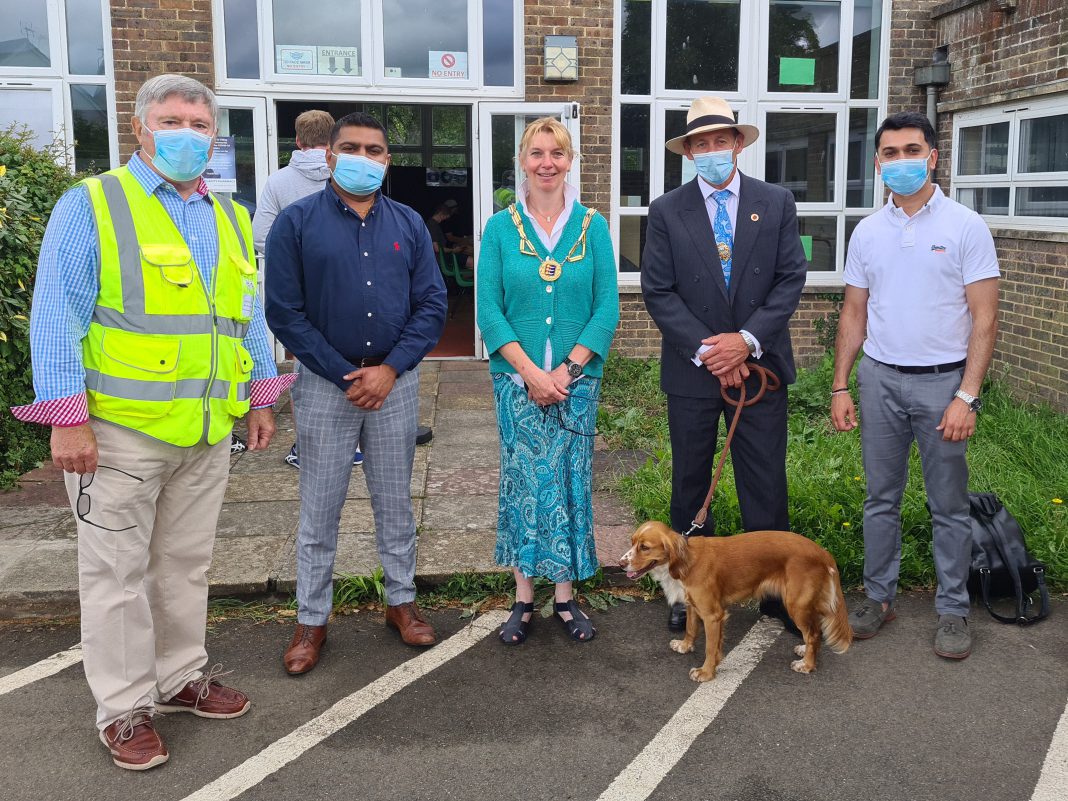Last Sunday morning, July 24, the mayor of Rye, Councillor Rebekah Gilbert and deputy mayor, Councillor Andi Rivett dropped by the Rye vaccination centre to see progress. Their visit coincided with peak patient numbers for the day. Rye clinical lead, pharmacist Ankit Tyagi and colleague Tejas from the Ticehurst (Clarity) group of pharmacies took a brief moment to chat about the operating procedures that have been well developed in recent weeks. The mayor thanked the pharmacists and the dedicated group of volunteers, who register, marshal and vaccinate the patients.
From a start in late May, the Rye centre is on track to complete around 6,000 doses this week. The centre continues to receive good feedback on the way it handles those coming forward who are anxious. Opening hours at the Rye centre are variable to match estimated demand and many other factors such as personnel availability. Up to date details can be found on the Facebook page @ryepfizer.
National developments
As well as regularly discussing local issues with the NHS Sussex Clinical Commissioning Group (CCG) and NHS England, we try to monitor all the wider Covid-19 developments, that might affect the vaccination programme.
The government remains concerned that the trend in the under-30s is reluctance to have the vaccine. So far, 58.4% of 18- to 24-year-olds and 58.9% of 25- to 29-year-olds in England have received a first dose since they became eligible on 18 June, according to Public Health England. However, as reflected in Rye, from last week the number appears to be rising. One reason for this is perhaps because of the suggestion by government that there might be a future need for vaccine passports to access some venues, businesses and even university buildings.
Separately we have seen some over 18s asking for last minute 2nd jabs to enable foreign travel. Although some early Pfizer guidance was that both jabs could be given within 3 weeks of each other, in Rye we work to government and NHS guidance that the jabs should be 8 weeks apart unless there is a significant clinical reason for doing otherwise.
Guidance for overseas travel remains subject to sudden change as it is dependent on the “traffic light” assessment of particular countries. Anyone planning a trip should look carefully at the government advice and consider the impacts of sudden change at the website.
For those who have been in contact with an infected person or been notified by the NHS, it is expected that later in August there will be more categories of the population moving towards daily testing rather than isolation. As an indication that the virus remains, there are a growing number of people in Rye who have recently been “pinged” by the NHS app and have had to self isolate. Others have telephoned in to opt out of vaccinations because they have Covid-19.
Is the end in sight?
Some scientists say the full impact of the unlocking in England on 19 July is hard to predict because first, increasing numbers have been vaccinated and secondly, behavioural changes. For the latter there is a reduction in children mixing as schools are now closed for the summer holidays; a tendency for people to continue to meet outdoors in the fine weather; the “residual caution” of many who are living well within the limits of the pre “Freedom Day” rules. What appears from the current data is that although Covid-19 hospitalisations and deaths are up, infections are down. This has caused some prominent scientists to talk of possibly “turning the corner” or reaching a “plateau”. Others emphasising caution, say that “only time will tell”.
Image Credits: Anthony Kimber .



